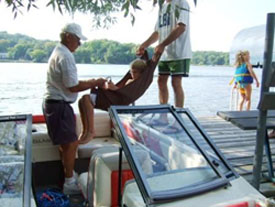Disabled Traveler

The world isn’t always prepared for the disabled traveler. But fun, safe, carefree travel is available to those who do not have full use of their legs. With a little pre-planning, disabled travelers can be on their way to great adventures too.
Rest Stops
The key thing to remember if you are disabled, or are travelling with a disabled person, is to map out your travel route. Mobile people seldom think about stopping to use the bathroom or stretching their legs. They just do it. But when you are a wheelchair-bound person or have one with you, this becomes important. Small, hole-in-the-wall gas stations don’t usually have enough room in their restrooms for an ambulatory person, let alone a person in a wheelchair.
If you are taking a road trip, take some time to review the websites for the Department of Transportation in each state you will be travelling through. Most will tell you where their rest stops are located (on which highway) and which are wheelchair accessible. Fortunately, you’ll find most state-run rest stops are equipped with at least one or two handicapped stalls. If you won’t be travelling on major highways, map out potential rest stops. Most national chain restaurants will have handicapped accessible stalls. You can’t always be sure with mom-and-pop restaurants.
The Great Outdoors
Whether you are going camping, hiking, fishing, boating, wildlife viewing, or picnicking, the first place to start is the state or city’s Department of Parks and Recreation or Environmental Conservation web site. It will tell you which parks and activities are wheelchair accessible. New York State’s Department of Conservation’s website for example, offers the services of “Access Coordinators” who can help you plan out your adventure according to your needs.
If you are going camping or RVing, there are plenty of campgrounds that offer wheelchair accessible amenities. The
KOA
website has a search function that allows you to type in “wheelchair”
and view a list of campsites that are handicapped accessible. Be sure to
call the campground ahead of time, to double-check accessibility and
make your reservation early to ensure you get the best campsite. For
example, if there is only one handicap accessible bathroom, you may have
to plan early to reserve a prime lot nearby.

Do you like to fish? Campgrounds that have access to piers are just right for wheelchair-bound persons. Equipping your wheelchair with a fishing pole holder and wheelchair bags allows you to carry all that you need for a day spent doing what you love.
Wheelchairs can be fitted with special wheels that are better on rough terrain or on a sandy beach. When enjoying the great outdoors, be sure to wear gloves if you are operating a manual wheelchair to keep your hands from getting dirty and scraped by debris picked up in the treads.
You may also want to have a Tuk-‘N-Kari™ with you for easy and quick transfer from wheelchair to sleeping bag, picnic table, boat (shown above) or for going up and down narrow RV or trailer steps and going through their narrow doorways.
Overseas Travel
While many countries provide services and accommodations for disabled travelers, many others do not. Whether you’re taking a cruise or flying overseas or to an otherwise far away destination, it is a good idea to consult a travel agent who specializes in disability travel. DisabledTravelers.com offers a list of full service and specialty travel agents who do just that. From scheduling accessible tours to booking hotels and van rentals, your travel agent will be instrumental in ensuring you have the trip of your dreams. They can also tell you about any restrictions or rules regarding service dogs, if you require a canine companion.
Regardless of where you travel, it’s always a good idea to carry with you a portable transfer device that can be used to easily and safely transport you to otherwise non-accessible areas. The Tuk-‘N-Kari™ is a good, lightweight option that can be easily stored in your carry-on or wheelchair bag. It can also be used as an emergency evacuation device, should your hotel have less than optimal evacuation devices for handicapped patrons.
Don’t let inadequate facilities sideline you. As a disabled traveler, you deserve to enjoy all of the experiences other travelers enjoy. With a little planning, any destination is within your reach.
Back to Superior Mobility
Back to Home Page from Disabled Traveler